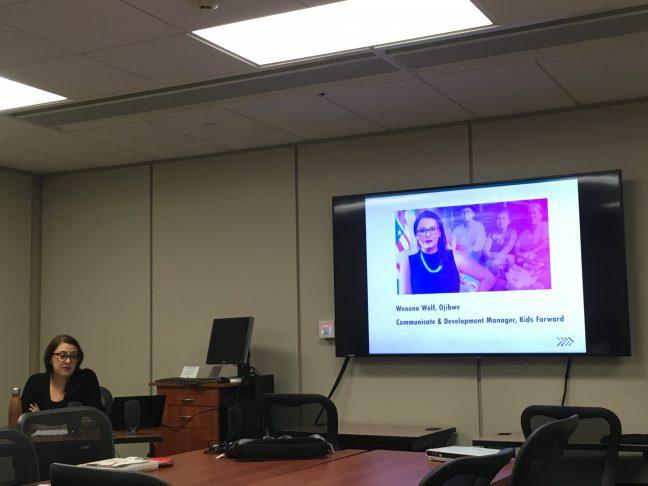The Native American Center for Health Professions and Kids Forward discussed the need to strengthen health and culture in Native American communities.
Winona Wolf, the communications and development manager at Kids Forward, is part of the Ojibwa tribe in Wisconsin. She explained the relationship between tribes and the U.S. government’s treaties, and inequities that exist for Native American communities.
She said a lot of the inequities facing Navie Americans have been shaped by federal politics and treaty agreements. For example, they perpetuate ethnocentric views, and Native American communities have been forced to assimilate.
“This is when boarding schools…would teach them [Native American children] how to be white. Many Native American children suffered abuse,” Wolf said.
Wolf said Native Americans were encouraged to move to urban areas where they were promised a job, but this promise was generally unfulfilled by the U.S. government.
Wolf said many Native American tribes have been subject to state and local jurisdiction. She referred to a video, from NPR, who’s message she believed in, which stated Native American nations were giving their rights to the government, but the government wasn’t giving the nations any rights.
“Tribes have not been granted the sovereign rights promised by our government,” Wolf said.
Wolf said the U.S. has a lot of institutional racism towards Native Americans. Wolf hopes we, as a people, can work on healing communities. She also wants to remove stereotypes, such as one that all Native Americans live on reservations.
Wolf said in comparison with white children, Native American children experience more poverty, and face disparities in arrest, depression and high school graduation rates, and that the Native American community overall has a higher mortality rate.
“The solutions and the remedies and the policies of how our communities are going to heal are going to come from our communities,” Wolf said. “They’re not going to come from the White House.”
Danielle Yancey, the director at NACHP, believes improving health care within Native American communities is one way to improve the communities.
Yancey is part of the Menomonee tribal community, which is indigenous to WI. She said many tribal people feel a close connection to their home, and are in the process of relearning who they are again, or in the process of “healing.”
Yancey said the best way to improve the health of the Native American people is to have them take care of each other themselves.
“We wanted to create some context about what is happening in our communities about health…and what, as a university, are we doing?”
Yancey said NACHP focuses on pre-college programming and a lot of work at the college level in pre-health. She said mentoring, networking, cultural programming and advising are ways to tackle health issues.
Yancey said it is important to work in partnerships and emphasized collaboration between Native American people to address health issues.
“Approach [health issues] with ‘what is the need of the community, and what do they want?’” Yancey said.


